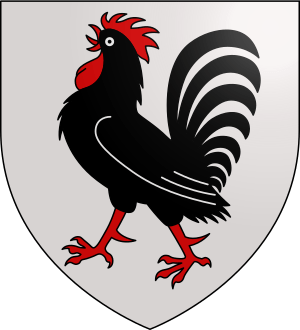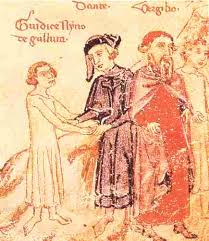Joanna of Gallura facts for kids
Joanna of Gallura (born around 1291 – died in Florence, 1339), also known as Giovanna Visconti, was the very last ruler of Gallura, a region in Sardinia. Even though she had the title of "Judge" (or giudicessa), she couldn't really control Gallura. She tried to claim her rights in Sardinia but it didn't work out. Eventually, she sold her claims to her relatives, the powerful Visconti family from Milan. They later sold these rights to the Crown of Aragon, a kingdom in Spain. Joanna is also briefly mentioned by the famous Italian poet Dante Alighieri in his great work, the Divine Comedy. Her father, who was a friend of Dante's, asks Dante to remind Joanna to pray for him.
Contents
Who Was Joanna of Gallura?
Joanna's Family and Early Life
Joanna came from the important Visconti family of Pisa. This family had been powerful in Pisa for a long time, producing many important politicians since the 900s. In 1205, a man named Lamberto Visconti married Elena of Gallura. This made him the first Visconti to become the ruler, or "Judge," of Gallura. After him, several other Visconti family members ruled Gallura, including Ugolino Visconti, who was Joanna's father.
Joanna was the daughter of Ugolino (also called Nino) and Beatrice. When her father Nino died in 1296, Joanna became the last Judge of Gallura. She was just a baby when she inherited this title, so her rule was mostly just on paper. Soon after her father's death, the Republic of Pisa took over most of her family's land and wealth. Pisa was connected to a political group called the Ghibellines. Joanna's father, Nino, had been a strong leader of the Guelph group. He had even been a mayor (called a podestà) in Pisa. But he was forced to leave Pisa in 1288. After that, he teamed up with Pisa's enemies, Florence and Lucca, and fought against Pisa.
In 1296, Pope Boniface VIII placed Joanna under the care of the city of Volterra. Joanna and her mother lived there for a few years. During this time, Joanna's mother, Beatrice, was going to marry a son of Alberto Scotto, a lord from Piacenza. However, Galeazzo I Visconti of Milan wanted to make an alliance with Beatrice's family, the Este family. He managed to stop Beatrice's first engagement and married her himself in 1300. This marriage made another powerful family, the Torriani, very angry. With help from Scotto, they forced the Visconti family out of Milan. Galeazzo then lived in Tuscany until he died, but Beatrice was eventually able to go back to Milan.
Marriage and Political Power
Even though Pisa had taken most of her family's lands, Joanna still had a lot of political importance because of her title as Judge of Gallura. Also, her parents came from very noble families. As she grew up, her position and beauty attracted many noblemen who wanted to marry her. Their families hoped to gain power in Sardinia through this marriage.
- One of the first men who wanted to marry Joanna was the son of Bernabò Doria, a nobleman from Genoa. A marriage between them would have brought Genoa and Pisa together against the Crown of Aragon.
- Another possible husband was Tedice della Gherardesca, the nephew of the Count of Donaratico. The idea of his marriage to Joanna caused a lot of disagreement among the people of Pisa, leading to conflicts.
- Finally, the Tuscan Guelphs suggested that Joanna marry Corradino Malaspina. His family already owned valuable lands in Sardinia. Marrying Joanna would have made them even richer and given them more territory.
- James II of Aragon, the king of Aragon, also wanted Joanna to marry an Aragonese nobleman. He hoped this would help him conquer Sardinia without having to use too much military force.
Despite all these powerful men wanting to marry her, Joanna did not marry any of them. In 1308, Joanna married Rizzardo IV da Camino, who was the Count of Ceneda and Lord of Treviso. Sadly, only four years after they married, Rizzardo was killed. After his death, another person named Guecello quickly took over as Lord of Treviso.
Later Life in Florence
From 1323 until she died in 1339, Joanna lived in Florence. The Guelph party in Florence gave her money to live on. They did this to honor her father's help and support for their political group.
Joanna in Dante's Divine Comedy
Joanna is mentioned in Canto VIII of Dante's Purgatorio. This is the second part of his famous work, the Divine Comedy. In this section, two angels with flaming swords stand on opposite sides of a valley. This sets the scene for what happens after Dante talks with Nino, Joanna's father, and Conrad Malaspina.
Dante and Nino have a happy reunion because they knew each other when they were alive. Nino asks Dante to please tell Joanna to pray for him. He says that Joanna is the only one left who can pray for him to help him reach salvation. Nino then criticizes his wife, Beatrice, for not mourning his death for very long. He calls her a changeable woman because she remarried Galeazzo.
when you are far from these wide waters,
ask my Giovanna to direct her prayers for me
to where the innocent are heard.
I think her mother has not loved me
since she stopped wearing her white wimple,
which, in her coming misery, she may long for.
There is an easy lesson in her conduct:
how short a time the fire of love endures in woman
if frequent sight and touch do not rekindle it.
The viper that leads the Milanese afield
will hardly ornament her tomb as handsomely
as the cock of Gallura would have done.—Dante Alighieri
Sordello, who had guided Dante and Virgil to this valley, tells them to look up. They watch a scene that is very familiar to the souls in this area: a snake slithers smoothly through the grass. When the angels' wings flap, the snake quickly slithers away in fear.



